Picture this: you’re enjoying dinner with family when you realize you can’t bite into your favorite foods anymore due to missing teeth. You’ve heard about dental implants and how they can restore your smile and confidence, but there’s one burning question on your mind—does Medicare cover dental implants? If you’re among the millions of Americans navigating Medicare benefits, understanding what’s covered (and what’s not) can feel overwhelming. Let me guide you through everything you need to know about Medicare coverage for dental implants and help you explore your options for achieving that confident smile you deserve.
Key Takeaways
- Medicare typically does not cover dental implants as they’re considered routine dental care, not medically necessary procedures
- Limited exceptions exist when dental implants are required due to accident, injury, or certain medical conditions like oral cancer •
- Medicare Advantage plans may offer some dental coverage, but implant coverage varies significantly by plan
- Alternative financing options including dental insurance, payment plans, and dental savings plans can help make implants more affordable
- Understanding your specific situation and exploring all available options can help you find a path to restore your smile
Understanding Medicare’s Approach to Dental Coverage
When it comes to does Medicare cover dental implants, the answer isn’t straightforward. Traditional Medicare (Parts A and B) has very limited dental coverage, treating most dental procedures as routine care rather than medically necessary treatments.
What Medicare Parts A and B Cover
Medicare Part A (Hospital Insurance) and Part B (Medical Insurance) focus primarily on medically necessary services. For dental care, this means:
- Emergency dental care in hospital settings
- Dental services required before certain medical procedures (like heart surgery)
- Treatment of dental conditions that complicate other medical conditions
- Jaw reconstruction following traumatic injury or cancer treatment
The Reality About Routine Dental Care
Unfortunately, Medicare considers dental implants as routine dental care in most situations. This means typical implant procedures for tooth replacement due to decay, gum disease, or normal aging aren’t covered under traditional Medicare.
When Does Medicare Cover Dental Implants?
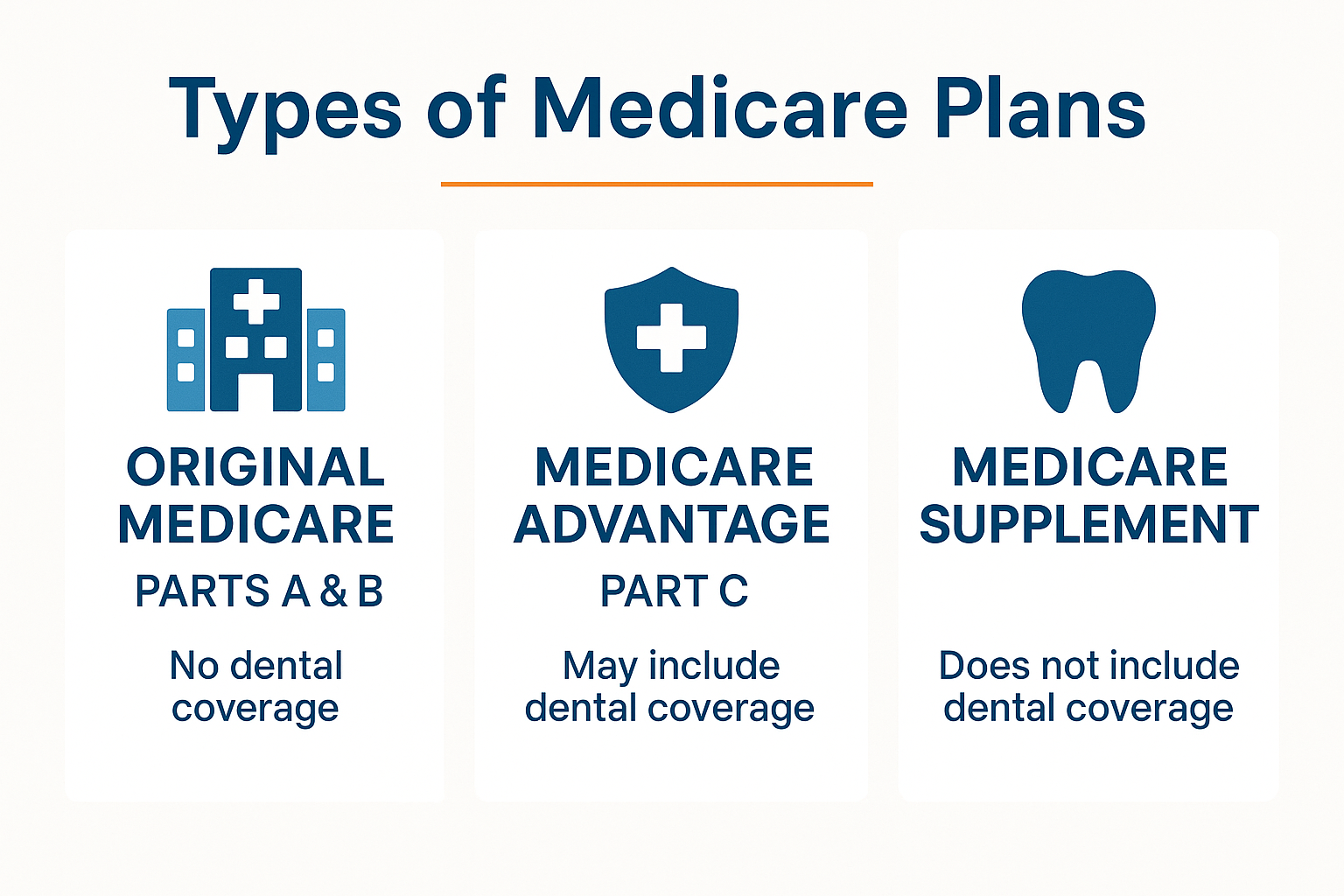
While rare, there are specific circumstances where Medicare may cover dental implants:
Medical Necessity Exceptions
- Accident or Trauma: If you lose teeth due to an accident or injury, Medicare might cover implants as part of reconstructive treatment
- Cancer Treatment: Oral cancer treatment that requires jaw reconstruction may include implant coverage
- Congenital Conditions: Certain birth defects affecting oral function might qualify for coverage
- Pre-Surgical Requirements: Implants needed before life-saving medical procedures could be covered
Documentation Requirements
To qualify for coverage under these exceptions, you’ll need:
- Detailed medical documentation showing medical necessity
- Physician referrals from your medical doctor (not just your dentist)
- Pre-authorization from Medicare before treatment begins
- Clear connection between the dental treatment and your medical condition
Medicare Advantage and Dental Implant Coverage
Medicare Advantage plans (Part C) offer more hope for dental coverage, including potential implant benefits.
What Medicare Advantage May Offer
Many Medicare Advantage plans include:
- Basic dental coverage for cleanings, exams, and X-rays
- Major dental services with varying coverage levels
- Annual maximum benefits typically ranging from $1,000 to $3,000
- Network restrictions requiring you to use specific providers
Evaluating Medicare Advantage Dental Benefits
When considering a Medicare Advantage plan for dental coverage:
Coverage Levels to Look For:
- Preventive care: Usually 100% covered
- Basic procedures: Often 70-80% covered
- Major procedures (including implants): Typically 50% covered or less
Important Limitations:
- Waiting periods of 6-12 months for major procedures
- Annual maximums that may not cover full implant costs
- Network requirements that might limit your choice of dental implant specialists in Dallas
Alternative Coverage Options for Dental Implants
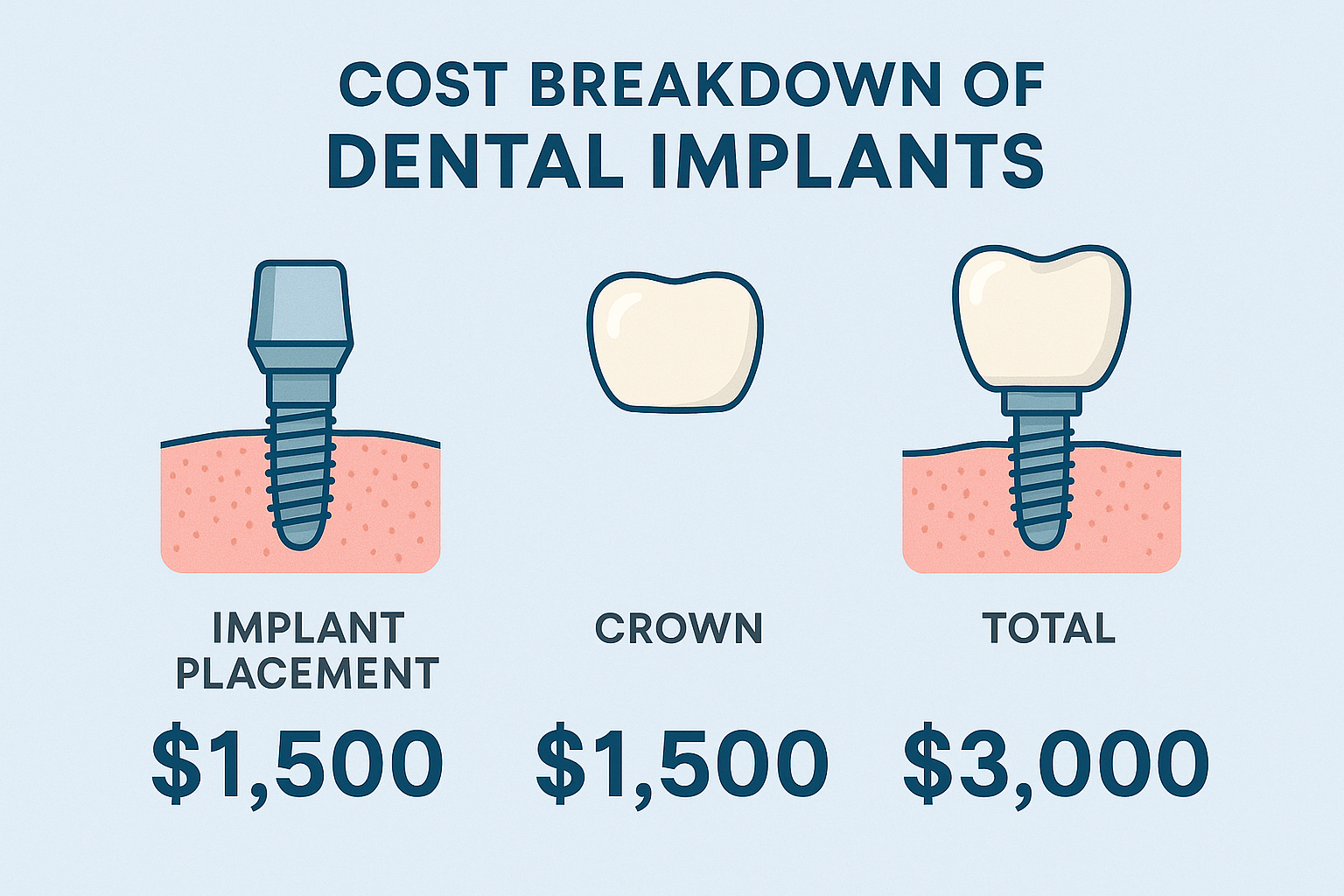
Since Medicare coverage for dental implants is limited, exploring alternative options becomes crucial for your journey to a confident smile.
Dental Insurance Plans
Standalone dental insurance can supplement Medicare:
- Monthly premiums typically range from $20-60
- Annual maximums usually between $1,000-2,000
- Waiting periods for major procedures often apply
- Coverage percentages vary by procedure type
Dental Savings Plans
Dental discount plans offer an alternative approach:
- Annual membership fees instead of monthly premiums
- Immediate access to discounted services
- No annual maximums or waiting periods
- Savings of 10-60% on dental procedures
Flexible Spending Accounts (FSAs) and Health Savings Accounts (HSAs)
If you’re still working or have access to these accounts:
- Pre-tax dollars can pay for dental implants
- Significant tax savings on your treatment costs
- No restrictions on dental procedure types
Cost Considerations and Financial Planning
Understanding the financial investment in dental implants helps you plan effectively.
Typical Dental Implant Costs
Single Tooth Implant:
- Implant placement: $1,500-3,000
- Crown: $1,000-2,000
- Total per tooth: $2,500-5,000
Multiple Teeth Options:
- All-on-4 dental implants: $15,000-30,000 per arch
- Individual implants: Multiply single tooth costs
- Implant-supported bridges: $6,000-15,000
Payment Plan Options
Many dental practices offer financing solutions:
- In-house payment plans with low or no interest
- Third-party financing through companies like CareCredit
- Extended payment terms to fit your budget
- Seasonal promotions that can reduce overall costs
Making Dental Implants More Affordable
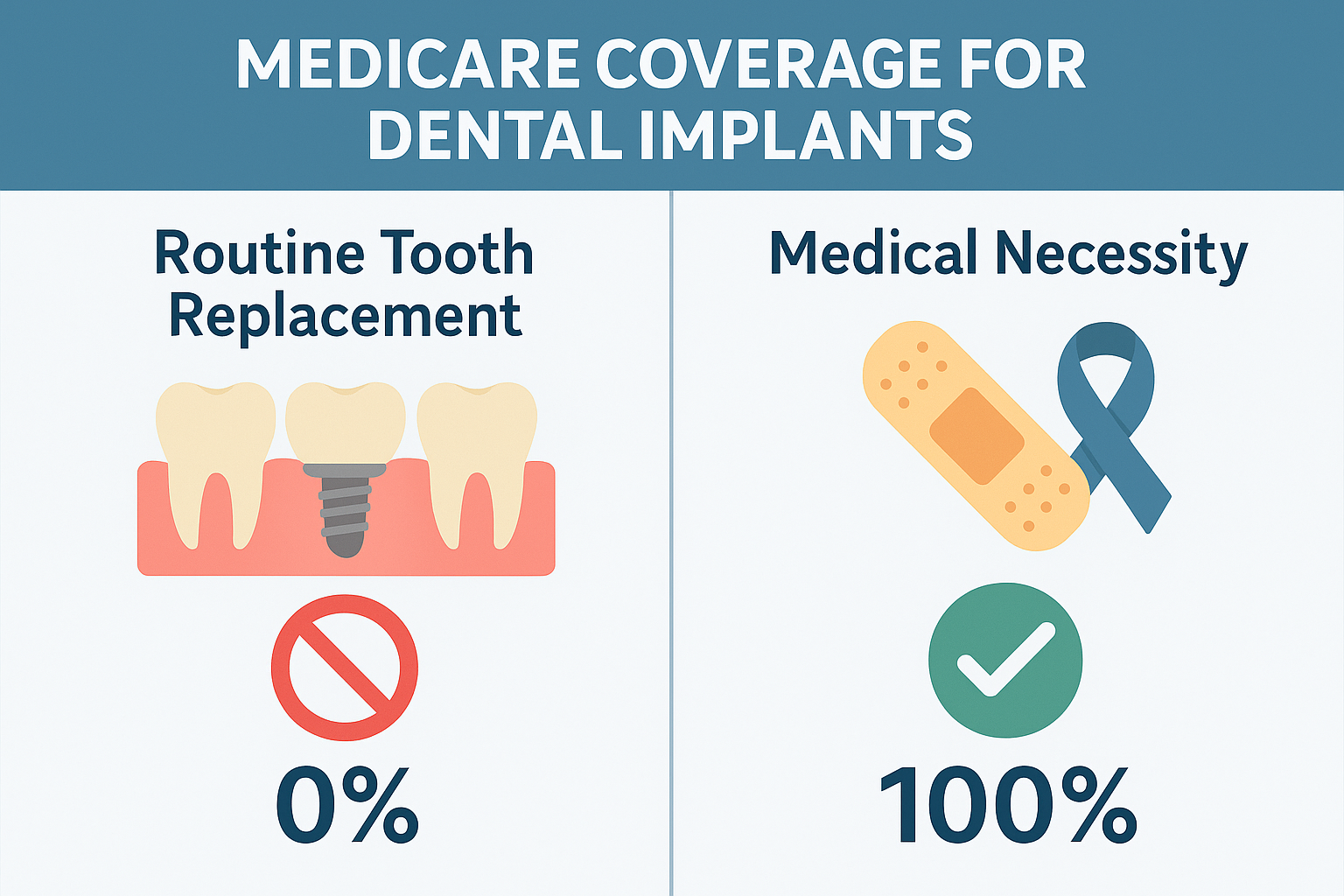
Even without Medicare coverage, there are strategies to make dental implants more accessible:
Research and Compare Providers
Finding the right provider can significantly impact costs:
- Get multiple consultations and quotes
- Look for providers offering comprehensive treatment plans
- Consider experienced Dallas dental implant specialists who may offer competitive pricing
- Ask about package deals for multiple implants
Timing Your Treatment
Strategic timing can help with costs:
- End-of-year timing to maximize insurance benefits
- Seasonal promotions offered by dental practices
- Coordinating with FSA/HSA annual contributions
- Planning around Medicare Advantage annual maximums
Alternative Treatment Options
Consider these options that might have better coverage:
- Partial dentures as a temporary solution
- Dental bridges which may have different coverage rules
- Implant-supported dentures for multiple missing teeth
- Phased treatment plans to spread costs over time
Questions to Ask Your Medicare Plan
When exploring does Medicare cover dental implants for your specific situation, ask these important questions:
Coverage Questions
- “What dental services are covered under my specific plan?”
- “Are there any circumstances where implants might be covered?”
- “What documentation would be required for medical necessity?”
- “Do I need pre-authorization for any dental procedures?”
Cost and Network Questions
- “What are my annual maximums for dental coverage?”
- “Which dental providers are in my network?”
- “What are my out-of-pocket costs for major dental work?”
- “Are there waiting periods for dental coverage?”
The Importance of Oral Health as You Age
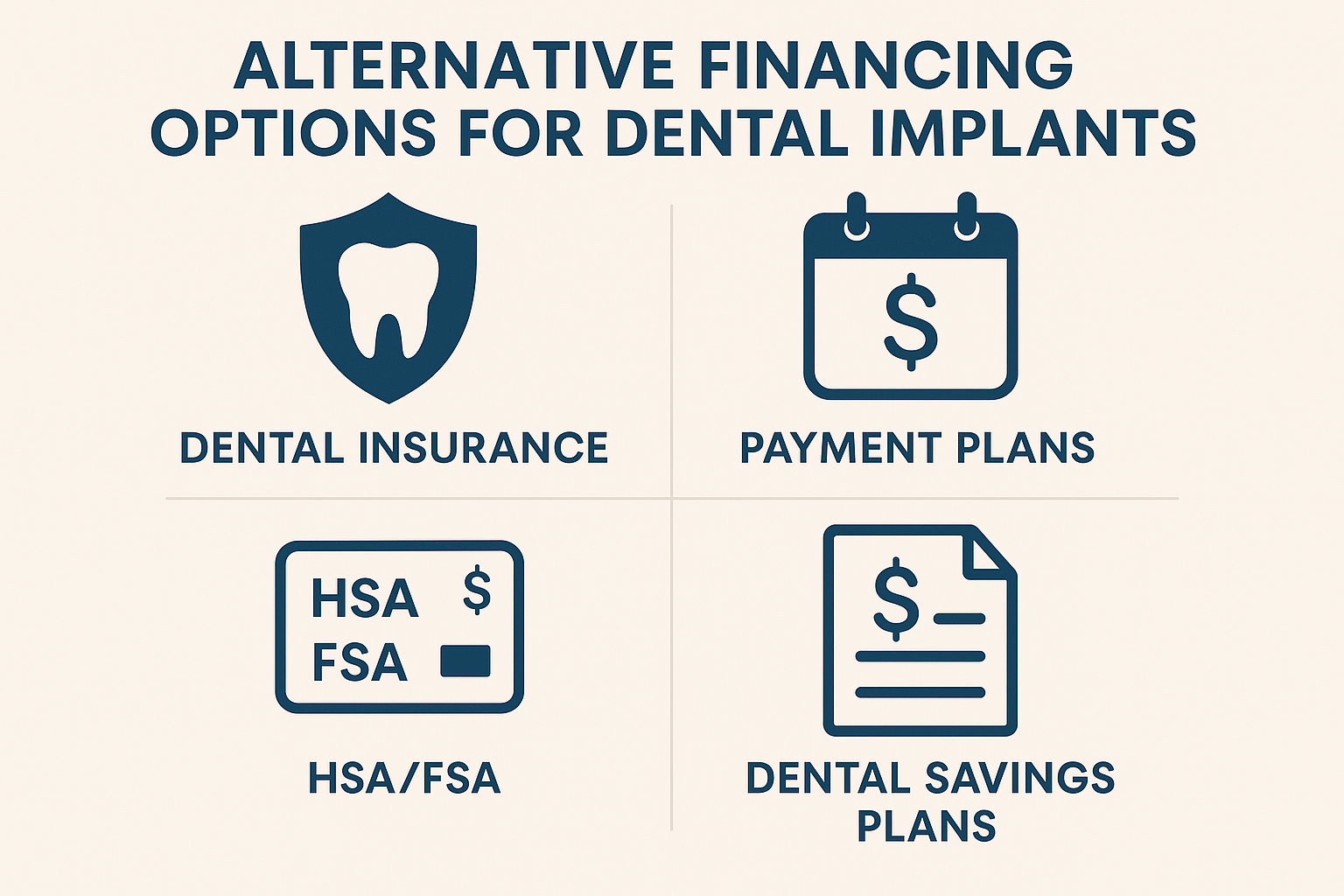
While navigating insurance coverage, remember that maintaining oral health becomes increasingly important with age:
Health Connections
- Heart disease links to gum disease
- Diabetes complications from poor oral health
- Nutrition impacts from missing teeth
- Social confidence affects mental health
Long-term Investment
Think of dental implants as a long-term investment in your health and quality of life. While the upfront costs may seem significant, implants can last 20-30 years with proper care, making them cost-effective over time.
Working with Your Healthcare Team
Collaboration between your medical and dental teams can be crucial, especially if you’re trying to establish medical necessity for implant coverage:
Medical Documentation
- Work with your physician to document any medical conditions related to tooth loss
- Ensure your dental and medical records clearly show the connection between your oral health and overall health
- Get referrals from medical doctors when appropriate
Treatment Coordination
- Coordinate timing between medical and dental treatments
- Ensure all providers understand your Medicare coverage
- Keep detailed records of all communications and treatments
Looking Ahead: Future Changes in Medicare Dental Coverage
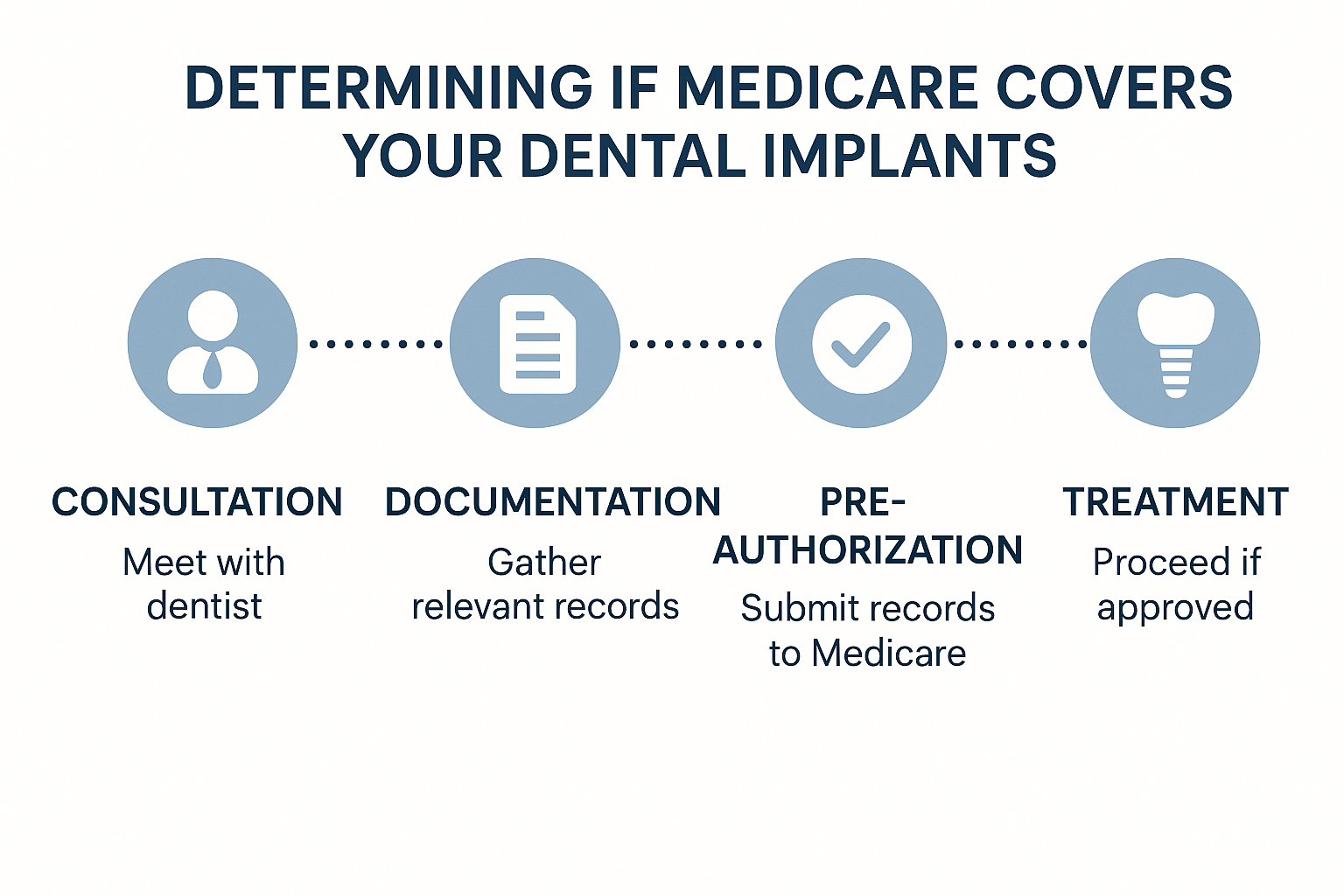
While current Medicare coverage for dental implants is limited, there’s ongoing discussion about expanding dental benefits:
Potential Changes
- Legislative proposals to add dental coverage to Medicare
- Medicare Advantage plan improvements in dental benefits
- Increased awareness of oral health’s connection to overall health
Staying Informed
- Monitor Medicare.gov for coverage updates
- Review your Medicare Advantage options annually during open enrollment
- Stay connected with your dental provider about coverage changes
Conclusion
So, does Medicare cover dental implants? The answer is complex but manageable. While traditional Medicare offers very limited coverage for dental implants, exceptions exist for medically necessary situations, and Medicare Advantage plans may provide some benefits. The key is understanding your specific situation, exploring all available options, and working with knowledgeable providers who can guide you through the process.
Your smile deserves expert care, and we make it stress-free. Don’t let insurance concerns prevent you from exploring your options for restoring your confident smile. Whether through Medicare exceptions, alternative insurance, financing options, or payment plans, there are paths to make dental implants accessible.
Take these next steps:
- Review your current Medicare coverage and any supplemental plans
- Consult with a qualified dental implant specialist to understand your treatment options
- Explore financing alternatives that fit your budget
- Document any medical conditions that might support coverage
- Consider the long-term value of investing in your oral health and confidence
Remember, every patient’s story matters, and there are solutions available to help you bite into your favorite foods again—without pain or worry. Your journey to a better smile starts with understanding your options and taking that first step toward consultation.


Leave a Reply
Share your thoughts or ask a question about dental implants. Your email address will not be published.